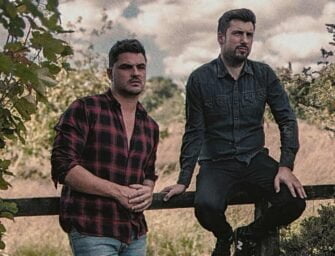Detailing the plight of Australia’s First Nations people, this rock anthem found an international audience upon its release in 1987
From Marvin Gaye to Bob Dylan, some of the most successful musicians on earth have shown just how potent the combination of a political message and a great tune can be. It’s a career path which Australian rockers Midnight Oil have followed since their self-titled debut album was released in 1978. However, it wasn’t until their sixth studio album, 1987’s Diesel And Dust, that they’re message found a truly international audience.
A key factor in Diesel And Dust’s success was the single Beds Are Burning. Fuelled by a passionate vocal performance from frontman Peter Garrett, the track brought to life the plight of the First Nations and referenced life in the Australian desert, “From Kintore, east to Yuendemu,” complete with wrecked cars and scared cockatoos. In 2009, more than three decades after its original release, a reworked version of the song featuring Lily Allen, Simon Le Bon and many others, was recorded to highlight the pressing need to start tackling climate change – a clear indication of its long-lasting appeal.
Here, Midnight Oil drummer Rob Hirst reveals how a journey into the desert inspired his band’s best-loved track…

Released: 10 Oct 1987
Artist: Midnight Oil
Label: Columbia
Songwriter(s): Rob Hirst, Jim Moginie, Peter Garrett
Producer(s): Warne Livesey, Midnight Oil
UK chart position: 6
US chart position: 17
“Jim has been my songwriting partner since we were schoolboys. We were from different schools but we got together when we were 15 and almost immediately started writing songs. We actually wrote three songs for this handback and one of them was accepted, a song called The Dead Heart which was recorded before we actually went on the bus on the so-called ‘Blackfella/Whitefella’ tour alongside the Warumpi Band.
“The Dead Heart was played over the PA system during the handback of Uluru, but one of the other songs that we had a scratch version of was a song called Beds Are Burning, with different lyrics. The ones which appeared on our Diesel And Dust album were actually filled in when we were touring around the desert. We spent three weeks in the central desert of Australia and then we spent another couple of weeks flying out of Darwin to the island communities.
“I wrote the chorus before we went out into the desert and it was actually translated from Italian. I had been to an art exhibition which featured the story of the fascists during the Second World War, Mussolini and the fightback from the partisans. The guy who put the exhibition on explained to me that there was an expression from Italy about the fightback from those partisans, ‘How could you sleep when beds are burning?’ and I thought we could write a song about the same idea of an ancient Australian community who had so much thrown at it but was still joyfully dancing in the desert, singing their songs and pushing back against all the shocking things that had been visited upon them ever since Europeans had arrived in this country.

Midnight Oil’s Rob Hirst [far right]: “We were very determined that our band would be seen as an Australian band…”
“We had the chorus written and we had the groove but I actually wrote the verse lyrics while travelling around with a friend of ours who was very well known in the desert – a guy called Charlie McMahon from the band Gondwanaland who was playing with us every night and was also a guide. We were still city slickers but were wide-eyed and learning, picking up as much as we could. I travelled around a lot with Charlie in his Toyota Troopcarrier, listening to him explain bits and pieces about the bush. I was jotting all the time in my black Moleskine book, writing things down in case melodies come into your head later on.
“We got to see the best and the worst of the Australian desert in the 80s. Back then there was an epidemic of petrol sniffing which was turning some of the kids into bush zombies. There was a lot of domestic violence in some of the communities, a lot of alcoholism too. There were a lot of negatives but those were also some of the most marvellous times we had together as a band, alongside the Warumpi Band; playing music under the stars to people whose ancestors had been there for up to 80,000 years.
“Then it was just a case of fleshing the song out. Jim had come in with the groove and I had the chorus, I had a melody for the verses but, as I said, we didn’t have the final lyrics until later and Pete [Garrett] came in with the bridge. At the end of the tour, we came back and recorded the song with producer Warne Livesey in a studio in Sydney. We had all the parts but there was a lot of production help from Warne, he had never been to the desert of Australia but we filled him in, very enthusiastically, with what we had seen. He picked up on it and did a marvellous recording and helped with the arrangement. Martin Rotsey was very instrumental in the arrangement of the song and then, in true Midnight Oil fashion, we added all those big strong harmonies.

Midnight Oil’s Rob Hirst [far right]: “We got to see the best and the worst of the Australian desert in the 80s.”
“We hoped the chorus would send a real shiver down the spine and that Pete’s delivery of the verse would sound very Australian. We were very determined that our band would be seen as an Australian band, in an international context. Land rights are something that appear in so many countries around the world, New Zealand, Canada, the United States, but we were determined that Midnight Oil wouldn’t be seen as one of those international bands, writing songs that could have come from anywhere. We were determined to put place names and other specific bits and pieces in all our songs.
“We had no idea that Beds Are Burning had any particular merit above all the other songs on the album. But I do remember Ward coming to us at the end and he seemed very pleased with the result of the writing, performance, arrangement, recording, mixing and mastering. Much to our surprise, that song opened up a much larger audience right across the world. On the back of that song and a few others from Diesel And Dust, we were able to get from a college audience in the States to a larger audience and play some quite big festivals in Europe.
“We would be getting above ourselves to think that the song had made a difference. The truth is, in many respects some of those problems I mentioned earlier still exist and, in some places, it’s worse. That isn’t because a whole lot of good-meaning people haven’t gone out to the desert and done their best. There has been a huge amount of goodwill and a huge amount of money, but there’s still a collision of cultures there in many ways. However, I would say in the arts particularly, there have been huge gains – massive ground that has been made. I wouldn’t want to be completely bleak but I wouldn’t want to be over the top about it either, there’s still a long way to go.
“We’re eternally grateful to all the people that came together to make that song as well known internationally. For us, the best thing was that it opened up the rest of our catalogue. We’d been putting out albums since 1978 and on the back of that song, and Diesel And Dust, those older records were released in places where we never thought they would be. Two years ago we did a big tour and we were amazed that the shows sold out in minutes in places that we thought people had long forgotten us. We played some amazing festivals in places we’d never been and we’re coming back to play more shows in June and July. We wouldn’t be playing any of those shows without Beds Are Burning. It’s a song which everyone seems to know and, whether or not they know the background or the meaning, it still seems to strike a chord and we’re very fortunate for that.”
Interview: Duncan Haskell









![Songwriting Credits… best new music playlist [September 2023]](https://www.songwritingmagazine.co.uk/wp-content/uploads/songwriting-credits-september-2023-335x256.jpg)






























Beds are Burning is the song that got me into the Oils in ‘88. Still a huge fan. Wish they would release the third song they offered to Aborigines.